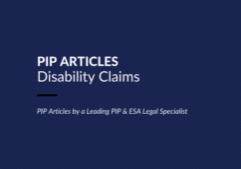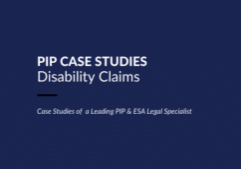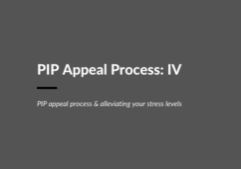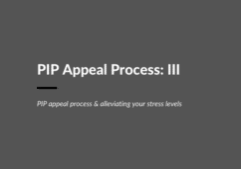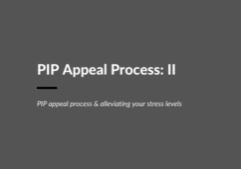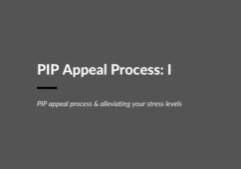Questions asked at PIP Assessment
Trick Questions?
I do not believe that the majority of assessors ask trick questions. I do believe that you will give a better account of yourself if you some idea of what to expect and if you take steps to prepare; call these tips if you like, but it is no part of my work to help people score more points than they are entitled to.
You kept a copy of your claim form, right? Our clients receive a copy of the completed form, and detailed advice on where they should score points within the test, how strong a claim they have to those point and what award they can expect. When the date for their face-to-face assessment comes through, we prepare during a phone call that supplements the information sheet they had with the advice letter and score sheet; this preparation focusses on their individual claim. The contents of this article form part of that preparation.
Taking part in the face to face assessment on your own will be noted and may well be used against you. You can see that this can be more of a problem if mental health forms at least part of your claim. It is not enough for the person to have come with you and then wait in the reception area at the assessment centre, they need to be in the room with you. Ideally, the person knows how you are affected, knows what you put in the claim form and understands where you should be scoring points in the PIP test, and why you should be scoring them. This is another reason why our clients receive a copy of the score sheet put together when the form is completed, so it can be shared with your friend or family member at this point. Why do they need to know about the test and where you should score points? Because you are likely to be somewhere between nervous and very stressed, so not thinking clearly. Your friend is not able to answer for you; that would not go down at all well, unless the questions are about something you could not be expected to know, such as what happens during a seizure for example. Your friend can have an input though, getting information to the assessor by prompting you. They might suggest that you tell the assessor about some event relevant to what is being asked, reminding you that you have not been able to do something that you used to do, etc. You do not want to irritate the assessor, you want them on your side, so it is worth avoiding taking someone who you know will not be able to stop themselves from butting in and trying to answer questions for you, even with the best of intentions.
Location
Think about where the assessment is to take place, assuming that it is at one of their centres, and how you will get there. Walking ability will be part of many people’s claims and it is absolutely no use explaining that you had no choice but to walk the 200 metres or whatever from the bus station or the car park. Telling them how long it took you will not help either, and even saying how many times you had to stop is little better. It is better if you can be dropped off as near as possible to the assessment centre by the taxi, or by your friend before they go off to park.
Should you record the assessment, whether it takes place at your home or an assessment centre? I would say yes, if you can. You will need to let them know as early in the process as possible if you decide to do this; do not just turn up with your recording equipment or wait until you have a date for the assessment. The assessor is not being difficult when they say that you have to be able to leave a copy of the recording with them, at the end of the assessment, it is in the PIP regulations. Consider taking two cassette recorders with you as these will do the job.
Please do not ask the assessor what their qualifications are or whether they are qualified to assess the impact of your particular medical problem. Many people have reported that this seems to annoy the assessor and it is likely to get you off to a bad start. Remember that they are not there to treat or diagnose you, they are supposed to be trained disability analysts and are there to assess the impact of your medical conditions on the activities included in the PIP test. I dread to think how many DLA, PIP, incapacity benefit, attendance allowance, ESA and UC forms I have helped with over my 21 years. Clients keep coming to me with medical conditions that I have never heard of; earlier this week it was Sporadic Hemiplegic Migraine Syndrome and when this lady’s PIP form arrives, she and I will complete it over the phone. She is the expert on her condition and how it affects her, and I bring 21 years’ experience of knowing what to ask, what is and is not relevant, what the law says about the meaning of words and phrases, and what case law says that the test activities are there to look at. This is not all that different to the role of the assessor, and in theory, their training ought to allow them to properly assess anyone.
Let us look at the what you will be asked about when the assessment begins. After looking at your ID to make sure that you are who you say you are, they will ask about each of your medical conditions. They will want to know how long you have had it, who diagnosed it, who manages it now, what the symptoms are and what variation there is in how it affects you. This question of variability is important; regulation 7 of the PIP regulations tells us that for PIP, the issue is how you are affected on at least of 50% of days. Think about that, it means that someone who has two unbearable days in an average week, but who is vey much better on the other five days, has to be assessed on how they are and what they can do on their better days because they are in the majority. It is fine for you to explain to the assessor what you can do on your better days, but it is important that they are clear about how things are for you on the majority of days. It is not unusual for a person’s ability to do things to vary within days, as well as between days. We could be talking about joint stiffness in the mornings, the after effects of frequent seizures or the wait before medication takes effect. The good news is that the PIP Assessment Guide tells assessors that if a point-scoring descriptor applies at any point in 24 hours, then it applies on that day, unless it is momentary. The bad news is that I have never seen either an assessor or a Decision Maker apply that, even though there is Upper Tribunal case law that adopted that guidance, so that it is the law. I would still recommend that you explain this variation within days to the assessor, in the hope that they will at least note it, and it will be there to support what you later include in a tribunal appeal.
Medication
Next topic for the assessor will be your medication, which sounds to be straight forward, but there are some things to be aware of. Doctors can be restricted in what they can prescribe, including for pain. For example, you should explain if you cannot take oral anti-inflammatories because you also have asthma. Similarly, you might have been prescribed stronger pain relief or anti-depressants but the side effects could not be tolerated. These things can be important, and you will not be asked about them. Instead, the assessor is more likely to conclude that your pain cannot be that bad because you are on low grade or moderate pain relief, and may not believe that you are in as much pain as you describe. Remember too that the part of the test that includes the taking of medication also asks about therapy. Some of you will use a TENS machine regularly, or wear compression stockings. You should mention these things at this point in the assessment; I would certainly have written about them on the medication page of the claim form as well.
Activities
Next, you are into the test activities, so Preparing food, Taking nutrition, etc. Please do not treat this as simply a question and answer exercise. This is your opportunity to explain the difficulties you have with these activities, as well as what you can do. Assessments are a lottery, in that there are undoubtedly good people doing this work, just as there are people who should not be doing it, and you do not know which you will get. If they are competent, they will ask you the right questions. If not, you will need to manage more of the meeting. You need to know where you should score points in the test, and why you should score them. This would have been set out in detail by us if had helped with the claim form, but if not, look at the test online and decide for yourself what wording applies to you and why. If you consider that there is a need for supervision with preparing or cooking a simple meal, then don’t let the assessor move onto the next part of the test if they have not explored the problem that you believe creates that need for supervision. For example, you may have problems with concentration, be prone to falling, have a significant tremor, or suffer with seizures. There may be near misses or accidents that need to be mentioned. Do not let these go by the board just because the assessor does not ask about them. It could make the difference between an award and no award, or between standard and enhanced rate. Always be polite and pleasant, but you do not want to walk away from the assessment wishing that you had said things.
You need to know where they are coming from; as an example, look at the statements that have points attached to them, what the test calls descriptors, for Washing & bathing, you will see that descriptor 4(e) is looking at whether you need help to get into or out of a bath. In the early days of the benefit, I would ask a client whether they showered or had baths, and asked questions accordingly. This was until the Upper Tribunal said that if a claimant could not get into either a bath or a shower, then they scored the 3 points for this activity, rather than the more usually awarded 2 points. That one point can again make all the difference between success and failure. It does not matter whether your bathroom includes a bath or not; the question is whether you could get in and out of a standard bath without help from someone. By a standard bath, I mean one without a grab rail, step or bath board. You may not be asked about all this, but you need to know if it is relevant to your claim, and to volunteer the information, if you are not asked the right questions.
Bathroom
Another part of the test where you may need to volunteer information is Managing toilet needs or incontinence. I get the distinct impression that some assessors are unwilling to explore this with claimants. The two areas of concern are them asking the wrong question, asking whether you can manage to use the toilet “without help” and not looking at difficulties with cleaning yourself. If you need to use something to get back to your feet after using the toilet, that can count as an aid, whether you use the nearby sink, a towel rail, the side of the bath, or if the something is a proper hand rail. Descriptor 5(b) scores 2 points for the need to use “an aid or appliance”, and any of these things count. If the assessor asks about the need for “help”, they do not invite this information, so you will need to explain how you get to your feet. If you cannot do a decent job of cleaning yourself, then you are likely to need to explain this, as you will probably not be asked. The claim form reminds us that a need can be a met or an unmet need, so if there are marks in underwear despite your best efforts, and if you either do not have someone to help, or you opt to manage rather than have their help with this, then there is a need for help, which would score 4 points instead of the more usually awarded 2 points. Remember that help with incontinence is limited to help to clean you, not the bed, the floor or other surfaces.
Mobility
When talking to the assessor about the physical side of mobility, you may be asked how far you can walk. Try to relate your answer to something that you and they can both visualise. This might be the length of the room you are sitting in, the walk from the reception area to the room, or the distance from a landmark (such as a named shop) to the door of the building. Don’t forget that you can use multiples, so that your answer could be three times the length of the assessment room. Instead of distance, you could be asked about time; how long you can walk for. I urge you to treat such a question with considerable caution, as I see it as you being offered rope with which to hang yourself. Distance is difficult enough for most of us to estimate, but time is that much harder. Claimants have talked about being repeatedly pressed for a number, and of having numbers put to them, such as 5 minutes or 2 minutes. They know average speeds of walking and use the number of minutes to arrive at a distance that will rarely do a claimant justice. I would suggest that you answer honestly, but make sure that you have watched the second hand on a watch or clock go around to 60 seconds/1 minute. Ask yourself if you would still be walking. If you would not expect still to be walking after those 60 seconds, then make it clear that the answer to how long would be measured in seconds, not minutes.
You may have read elsewhere about the requirement to consider whether you can do something (prepare food, walk 20 metres or anything else in the test) safely, to an acceptable standard, repeatedly and within a reasonable time period. This wording comes from regulation 4(2A), and the only problem is that I have never seen either an assessor or a Decision Maker apply that provision. You see them pay lip service to the wording in this regulation when justifying their choice of descriptor, but in my experience, the vast majority of assessors do not have a clue about how to apply it, so please do not rely on it happening at your assessment, or as part of your reconsideration, come to that. A tribunal can be expected to have a much better understanding.
Observations
The next section in the assessor’s report is Observations, where they record what they saw of you. Bear in mind that they comment on how you respond to your name being called, how you got up from a chair and sat down in the next one, how you walked to the assessment room and how far you walked (you see some bizarre estimates), how you handled your ID, what eye contact you made with them, whether you looked tense, anxious, withdrawn, etc, how you were dressed, how you took off any coat, etc. Be yourself; you want them to see you how you usually are, so there is no point in trying to keep up with a young assessor who is running behind schedule. If you need to take you time or stop, then do that. There are no prizes for pushing yourself on this day of all days, especially if you know that you would pay for it later.
Movements
You are now into the final part of the test, the physical movements. You are likely to be asked to show them a fist grip, a pinch grip (between thumb and forefinger), to put your hands behind your head and behind your back. These movements would not be asked of you if your difficulties are limited to mental health, thinking problems or something like epilepsy, but otherwise you will be asked to bend forward, noting how far down your legs you can slide your hands. You will be asked to stand on one leg, to stand on tiptoes and to crouch down. You can decline any or all of these movements, but declining tells them nothing about your limitations, so my advice is to attempt them and let them see your limitations for themselves. I realize that this is easy for me to say, and it must be your call. Many people are very wary of being asked to crouch down as this involves going down to the floor without bending, mainly using your knees, and then rising again. If you decide to try this and are worried, do it by the desk or other support, or have your companion there, ready to help in needed.
Conclusions
Finally, people regularly describe being reassured by the assessor, either that they have nothing to worry about, or that they have a particular knowledge of the person’s medical condition. Please do not relax or be reassured; instead stay focussed and remain professional. Too many times I have been heard this from claimants, who have then scored badly. They took the reassurance at face value and did not say all they were going to say. You have just one shot at the assessment, so say all that you came to say; that way you can leave knowing that you have done your best and the result is out of your hands.

